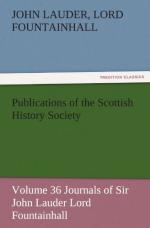On the 1 of October 1671 died Alexander,[608] Lord Halkerton, at his oune house, of the age of 77. He entered to his place in Session by simony, or rather committendo crimen ambitus, for he payed to my Lord Balmanno 7000 merks (a great soume at that tyme when their salaries ware small), to dimit in his favors, and by my Lord Traquaires moyen, then Threasurer whosse creature he was, he got the dimission to be accepted by his Majesty. This was about the 1643. I shall not say of him, as was said of Pope Hildebrand alias Gregory the 7th, Intravit ut vulpes, regnavit ut Leo, mortuus est ut canis. Only this I shall say, wheir places of justice are bought, whow can it be otherwayes but justice will be sold. The family is said to be pretty old, and both their name and stile to be taken from the charge they had at the tyme our Kings of Scotland resided in the Mernes, whosse falconers they ware, and their village was hence called the Haukerstoune. They say my Lord Arbuthnet was at that tyme King’s porter, and that he hes a peice of land yet designed Porterstoune; and that some other their was landresse, and so had a village called Waschingtoune.
[608] Falconer.
On the 15 of October 1671 died Mr. William Douglas, Advocat, or rather the poet, since in that he most excelled.
In the end of the preceiding summer Session Adam Cunyghame, sone in law to James Wallace, Maisser, was received conjunctly to the office of maisserie with the said James, conforme to ane gift of the said place to them both conjunctly and to the longest liver of them tua.
Arthur Forbes, having some clame upon the estate of Salton, and pershuing the Laird of Philorth, now Lord Salton, he was very rigorously and partially handled by my Lord Newbayth,[609] who heard the cause. It being againe enrolled in the beginning of November, and my Lord Newbayth falling to be ordinar in the Utter house, Arthur, out of a just resentiment of the past wrong and fear of his future carriage, come to my Lords chamber and boasted (as my Lord Newbayth sayes) in thir words, If you call that action of Philorth against me I vow to God I’le sie the best blood in your body. Newbayth having complained, and Arthur being theiron incarcerat and examined, denied he spoke any such words, and declared he only said, My Lord, if you continue to do me wrong (as you have done already, as appears because the Lords redrest me) I’le have the sentiment of the haill 14 Lords on it; and if that be denied, I’le complain to the King. After he had lyen some 4 or 5 dayes in prison he was set at freedome, having first acknowledged a wrong and craved my Lord Newbayth pardon in presence of the haill Lords and Advocats on the 10 of November. Before he did it the President had a short discourse whow the gentlemans carriage had bein modest thitherto, and my Lord Newbayth was earnest intercessor for him, and theirfor they resolved not to make him the first exemple; but they assured all, of whatsoever rank




